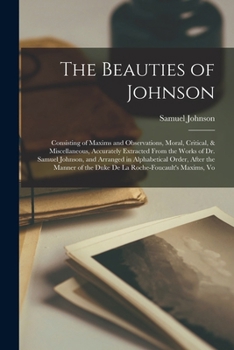The Beauties of Johnson: Consisting of Maxims and Observations, Moral, Critical, & Miscellaneous, Accurately Extracted From the Works of Dr. Sa
Select Format
Select Condition 
Book Overview
This work has been selected by scholars as being culturally important, and is part of the knowledge base of civilization as we know it.
This work is in the "public domain in the United States of America, and possibly other nations. Within the United States, you may freely copy and distribute this work, as no entity (individual or corporate) has a copyright on the body of the work.
Scholars believe, and we concur, that this work is important enough to be preserved, reproduced, and made generally available to the public. We appreciate your support of the preservation process, and thank you for being an important part of keeping this knowledge alive and relevant.
Format:Paperback
Language:English
ISBN:1019128240
ISBN13:9781019128244
Release Date:October 2022
Publisher:Legare Street Press
Length:476 Pages
Weight:1.46 lbs.
Dimensions:1.0" x 6.1" x 9.2"
Customer Reviews
customer rating | review
There are currently no reviews. Be the first to review this work.













